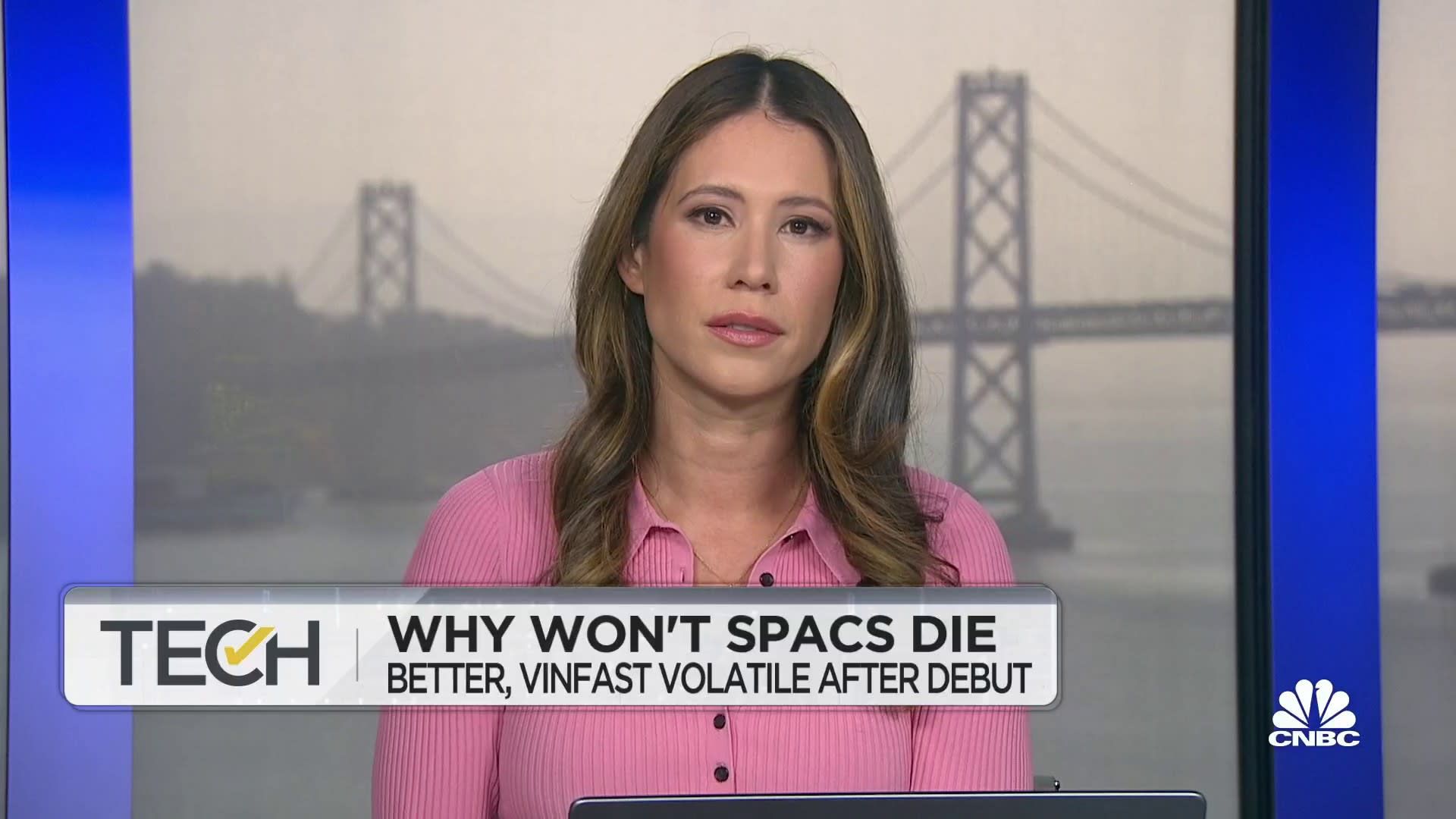VinFast electric vehicles are parked before delivery to their first customers at a store in Los Angeles, March 1, 2023.
Lisa Baertlein | Reuters
Vietnamese electric vehicle maker VinFast‘s ambitious plan to deliver as many as 50,000 vehicles this year is “unrealistic,” according to one analyst.
VinFast said it expects to deliver 40,000 to 50,000 vehicles in 2023 despite a weak global economy. That’s almost seven times the 7,400 EVs it sold last year, all in Vietnam.
The company delivered only 11,315 vehicles in the first half of this year, of which 7,100 were sold to Green and Smart Mobility, a Vietnamese taxi company controlled by parent Vingroup, the firm said during its second-quarter earnings call on Sept. 21. In April, Green SM launched a pure EV taxi service in Vietnam with VinFast models.
Shares of Vingroup, one of the largest conglomerates in Vietnam, closed at 45,200 Vietnamese dong ($1.85) on Wednesday, its lowest level since November 2017, according to Refinitiv data.
“More than 50% of EV volume during 1H2023 were to a related company while U.S. volume was less than 200 units raising serious concerns over demand for VinFast’s EVs,” Shifara Samsudeen, equity analyst at LightStream Research, said in a report published on SmartKarma.
Through June, only 137 VinFast EVs — all VF8 SUVs— were registered in the U.S., according to automotive data provider S&P Global Mobility which CNBC confirmed.
U.S. sales aren’t expected to improve any time soon. The reputational issues caused by the launch of the VF8 will not be solved by the VF9.
David Byrne
Analyst, Third Bridge
Meanwhile, U.S. rival Tesla and China’s XPeng delivered 889,015 and 300,145 electric cars, respectively, during the first half of the year.
“VinFast’s ambitious EV plan seems unrealistic. It seems unlikely for VinFast to meet its 50,000 EV target for 2023 and our revised forecast suggests there is further downside despite shares dropping more than 50% vs IPO,” said Samsudeen.
In response to CNBC’s request for comment, VinFast said it is “ramping up production to ensure delivery targets in international markets.”
“Besides, VinFast will soon expand to Southeast Asian and Middle Eastern markets soon, which will also boost our production,” the company told CNBC.

VinFast, which has yet to make a profit, began trading on the Nasdaq on Aug. 15. Its share price soared more than 250% on the first day of trading, but has since dropped more than 60%.
Ambitious plans
VinFast has been ramping up its expansion outside of Vietnam this year, in a bid to compete with automakers globally.
“We have established our operational facilities, including sales network in Vietnam, North America and Europe, and moving forward, we plan to expand our coverage to Asia-Pacific, Middle East and other potential markets globally,” VinFast CEO Lê Thị Thu Thủy said during the firm’s second quarter earnings call.
“We have ambitious plans to deliver seven models in Vietnam, North America, Europe and Asia over 2023 and 2024, such as delivering the VF9 in North America by the end of the year, as well as targeting first delivery of the – the VX6 later this year and the – the VX7 and VF3 in 2024,” said Lê.
Our U.S. sales are improving at our stores. And with the upcoming addition of dealers, we will likely exceed our plan for the year.
Higher prices
Analysts also noted that VinFast’s models are not competitively priced. For example, VinFast’s VF9 model is priced from $83,000 whereas the Tesla Model X is priced from $68,590 after federal tax credit and gas savings.
Additionally, Tesla passenger vehicles qualify for a $7,500 federal tax credit in the U.S., while VinFast vehicles are currently not eligible as they are not built in the U.S.
“[This suggests] that it may not as easy as said to increase the sales volume in the U.S. and other foreign markets given more established EV models are selling for a lower price,” said Samsudeen.
“Our experts questioned the pricing decision of VF9 in the US market. It is more expensive than key, more established competitors such as the Kia EV9 and the Tesla Model X, despite the platform being internal combustion engine-derived, compromising its performance and range,” said Bryne.
VinFast told CNBC that “experts have carefully researched and priced our vehicles properly.” It also said it does not consider some of these mentioned vehicles as their competitors, without specifying models.
During the second quarter, VinFast posted a net loss of $526.7 million, improving 8.2% from the same period a year ago.
VinFast expects to break even by the end of 2024, its founder Pham Nhat Vuong reportedly told investors at the company’s annual general meeting in May.
This article was originally published on CNBC

